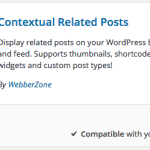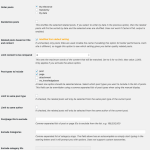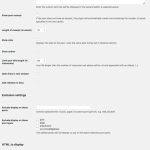The Contextual Related Posts (CRP) WordPress plugin is designed to enhance user engagement by displaying related content at the end of your posts. It uses a sophisticated algorithm powered by MySQL’s full-text search capabilities to determine the relevance of posts.
How It Works
One of the key features of the CRP algorithm is its utilisation of MySQL FULLTEXT search capabilities. When searching for related posts, CRP examines the content of posts, including the post title and post content. This allows the algorithm to identify relevant keywords and phrases within the content, enabling it to match related posts based on textual similarity.
Free Version
In the free version of CRP, if you enable the setting to search content, the algorithm gives equal weight to the post_title and post_content. This means that a keyword found in the title is considered just as significant as one found in the content.
Pro Version
The Pro version of CRP takes this a step further. It introduces an additional index for the post excerpt. If you’ve been setting manual post excerpts, you can now take advantage of this field to find related posts based on its content.
CRP Pro also introduces a weighting system that enables users to assign different weights to the post title, post content, and post excerpt when determining relatedness. You will find new settings under the List Tuning tab which allows you to assign the different weights.
For example, if a user prefers to prioritise the post excerpt over the post content in related post suggestions, they can assign a higher weight to the post excerpt. This flexibility allows users to customise the related posts algorithm to better align with their content strategy and user preferences.
Advanced Filtering
In addition to its search and weighting capabilities, CRP offers advanced filtering options to further refine the related posts displayed. Users can limit related posts based on various criteria, including:
- Post types: Limit related posts to posts, pages and/or custom post types. You can also limit it to the same post type.
- Author: Limit related posts to those written by the same author, helping to maintain consistency in content style and tone.
- Category: Restrict related posts to those belonging to the same category, ensuring thematic relevance and coherence.
- Tag or Custom Taxonomy: Filter related posts based on shared tags or custom taxonomies, facilitating content discovery within specific topics or themes. You can use this option if you do not want to use the full-text indexes. If enabled, it will only select posts from the same primary category/term. This is usually set using your SEO plugin and will default to the first category/term returned by WordPress.
- Meta Field Value: Narrow down related posts based on the value of custom meta fields, providing even more granular control over post relationships.
By leveraging these advanced filtering options, users can tailor the related posts algorithm to suit their site’s content structure and audience preferences, resulting in more targeted and meaningful content recommendations.
Configuring the Algorithm
To configure the CRP algorithm, navigate to the List Tuning tab under the plugin settings in your WordPress dashboard. Here you can adjust the weights for the Pro version and set up the filtering options to match your preferences.
 Troubleshooting Related Posts do not display
Troubleshooting Related Posts do not display Contextual Related Posts shortcode
Contextual Related Posts shortcode Contextual Related Posts Settings – List tuning
Contextual Related Posts Settings – List tuning Contextual Related Posts Settings – Output
Contextual Related Posts Settings – Output